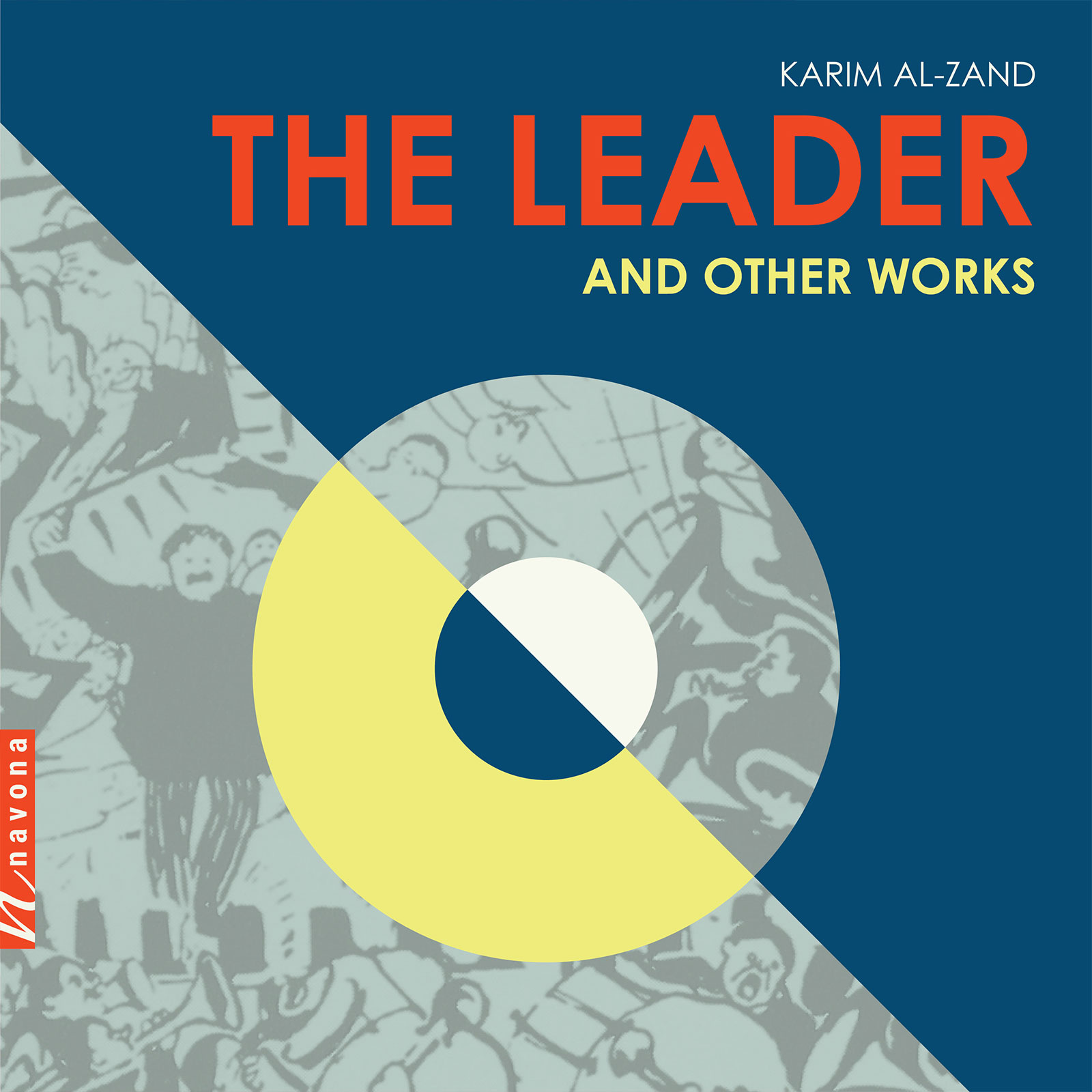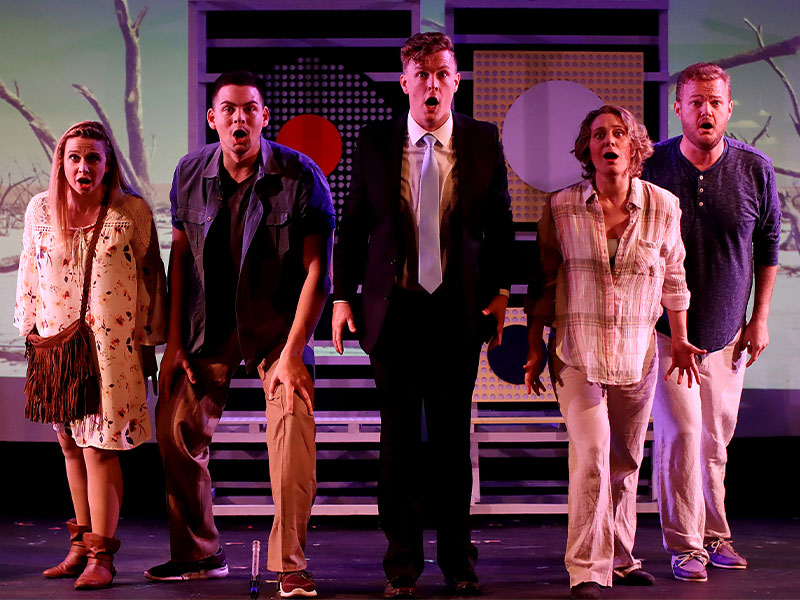The Leader
Karim Al-Zand composer
Mark Diamond baritone
Aidan Smerud baritone
Megan Berti mezzo-soprano
Zach Averyt tenor
Lindsay Russsel Bowden soprano
Eiki Isomura conductor
Omri Barak cornet; Michael Clark piano; Matthew J. Detrick violin; Wesley Ducote piano; Thomas Frey clarinet; Alex Garde percussion; Max Geissler cello; Sonja Harasim violin; Mary-Grace Johnson violin; Julia Kirk viola; Andrew Laven cello; Natalie; Lin-Douglas violin; John Mietus double bass; Sam Park violin; Ben Roidl-Ward bassoon; Jihong Son trombone; Alexandra Smither soprano; Chapman Welch mandolin; Willie Yeh flute/piccolo
THE LEADER from Canadian-American composer Karim Al-Zand is at once timeless and also deeply relevant for the age we live in. A commentary on the rise of fascist tyranny, its titular piece tells the story of a buffoonish charlatan who is adored despite his ridiculous behavior, echoing concerns of the modern day in this chamber opera based on Eugene Ionesco’s 1953 satire Le Maître. Another vocal work, Songs from the Post Truth Era similarly comments on the political realities (or unrealities) of our time. The album features several other chamber works by Al-Zand including his Six Bagatelles, with music inspired by the art of Robert Motherwell (1915–1991).
Listen
Stream/Buy
Choose your platform
Track Listing & Credits
| # | Title | Composer | Performer | |
|---|---|---|---|---|
| 01 | The Leader: Prologue–Trio: It’s Better If He Doesn’t See Us (Moto perpetuo) | Karim Al-Zand; Eugène Ionesco, libretto | The Leader Cast* | 2:36 |
| 02 | The Leader: Duo: Forgive Me, Madame (Serenade) | Karim Al-Zand; Eugène Ionesco, libretto | The Leader Cast* | 3:14 |
| 03 | The Leader: But, the Leader swore that he’d be passing here | Karim Al-Zand; Eugène Ionesco, libretto | The Leader Cast* | 1:12 |
| 04 | The Leader: Breaking News!–Trio: The Leader’s Coming | Karim Al-Zand; Eugène Ionesco, libretto | The Leader Cast* | 3:25 |
| 05 | The Leader: Is he coming past here? | Karim Al-Zand; Eugène Ionesco, libretto | The Leader Cast* | 1:06 |
| 06 | The Leader: Trio: Long Live the Leader | Karim Al-Zand; Eugène Ionesco, libretto | The Leader Cast* | 3:47 |
| 07 | The Leader: Duo: Let’s Go to the Market (Reverie) | Karim Al-Zand; Eugène Ionesco, libretto | The Leader Cast* | 2:59 |
| 08 | The Leader: Breaking News!—Trio: The Leader is Being Pressed | Karim Al-Zand | The Leader Cast* | 5:25 |
| 09 | The Leader: Duo: You Won’t Catch Me! | Karim Al-Zand; Eugène Ionesco, libretto | The Leader Cast* | 1:50 |
| 10 | The Leader: Finale | Karim Al-Zand; Eugène Ionesco, libretto | The Leader Cast* | 7:31 |
| 11 | Six Bagatelles: Mezzotint in Indigo | Karim Al-Zand | Wesley Ducote, piano; Natalie Lin-Douglas, violin; Andrew Laven, cello | 1:13 |
| 12 | Six Bagatelles: Orange Lyric | Karim Al-Zand | Wesley Ducote, piano; Natalie Lin-Douglas, violin; Andrew Laven, cello | 1:43 |
| 13 | Six Bagatelles: Gauloises Bleues | Karim Al-Zand | Wesley Ducote, piano; Natalie Lin-Douglas, violin; Andrew Laven, cello | 1:39 |
| 14 | Six Bagatelles: Yellow Chord | Karim Al-Zand | Wesley Ducote, piano; Natalie Lin-Douglas, violin; Andrew Laven, cello | 2:46 |
| 15 | Six Bagatelles: Three Forms in Red | Karim Al-Zand | Wesley Ducote, piano; Natalie Lin-Douglas, violin; Andrew Laven, cello | 1:46 |
| 16 | Six Bagatelles: Black Elegy Returning Black (Nocturne) | Karim Al-Zand | Wesley Ducote, piano; Natalie Lin-Douglas, violin; Andrew Laven, cello | 2:47 |
| 17 | Songs from the Post-Truth Era | Karim Al-Zand | Alexandra Smither, soprano; Ben Roidl-Ward, bassoon | 6:04 |
| 18 | Capriccio No. 5 | Karim Al-Zand | Sonja Harasim, violin | 2:41 |
| 19 | Capriccio No. 6 | Karim Al-Zand | Matthew J. Detrick, violin | 1:59 |
| 20 | Stomping Grounds: hop|skip|jump | Karim Al-Zand | Michael Clark, piano; Sam Park, violin; Thomas Frey, clarinet | 4:09 |
| 21 | Stomping Grounds: dog days dirge | Karim Al-Zand | Michael Clark, piano; Sam Park, violin; Thomas Frey, clarinet | 3:33 |
| 22 | Stomping Grounds: mbira song | Karim Al-Zand | Michael Clark, piano; Sam Park, violin; Thomas Frey, clarinet | 3:54 |
| 23 | Stomping Grounds: sto(m)p time dance | Karim Al-Zand | Michael Clark, piano; Sam Park, violin; Thomas Frey, clarinet | 3:16 |
The Leader Cast*
Mark Diamond, baritone
Aidan Smerud, baritone
Megan Berti, mezzo-soprano
Zach Averyt, tenor
Lindsay Russsel Bowden, soprano
Eiki Isomura, conductor
Willie Yeh, flute/piccolo
Thomas Frey, clarinet
Omri Barak, cornet
Jihong Son, trombone
Alex Garde, percussion
Sam Park, violin 1
Mary-Grace Johnson, violin 2
Julia Kirk, viola
Max Geissler, cello
John Mietus, double bass
Chapman Welch, mandolin
The Leader
Recorded December 11 & 12, 2021 in Stude Hall, Rice University, Houston TX
Recording Session Engineer Andy Bradley
Six Bagatelles
Recorded April 14, 2019 in KUHF Studio, Houston TX
Recording Session Engineer Todd Hulslander
Songs from the Post-Truth Era
Recorded April 14, 2019 in KUHF Studio, Houston TX
Recording Session Engineer Todd Hulslander
Two Capriccios
Capriccio No. 5 Recorded October 23, 2018 in KUHF Studio, Houston, TX
Capriccio No. 6 Recorded October 30, 2018 in KUHF Studio, Houston, TX
Recording Session Engineer Todd Hulslander
Stomping Grounds
Recorded December 5, 2021 in Duncan Hall, Rice University, Houston TX
Recording Session Engineer Todd Hulslander
Mastering Andy Bradley
Executive Producer Bob Lord
A&R Director Brandon MacNeil
A&R Quinton Blue
VP of Production Jan Košulič
Audio Director Lucas Paquette
VP, Design & Marketing Brett Picknell
Art Director Ryan Harrison
Design Edward A. Fleming, Morgan Hauber
Publicity Patrick Niland, Aidan Curran
Artist Information

Karim Al-Zand
The music of Canadian-American composer Karim Al-Zand (b.1970) has been called “strong and startlingly lovely” (Boston Globe). His compositions are wide-ranging in influence and inspiration, encompassing solo, chamber, vocal, and orchestral works. From scores for dance, to compositions for young people, to multidisciplinary and collaborative works, Al-Zand’s music is diverse in both its subject matter and its audience. It explores connections between music and other arts, and draws inspiration from varied sources such as graphic art, myths and fables, folk music of the world, film, spoken word, jazz, and his own Middle Eastern heritage.




